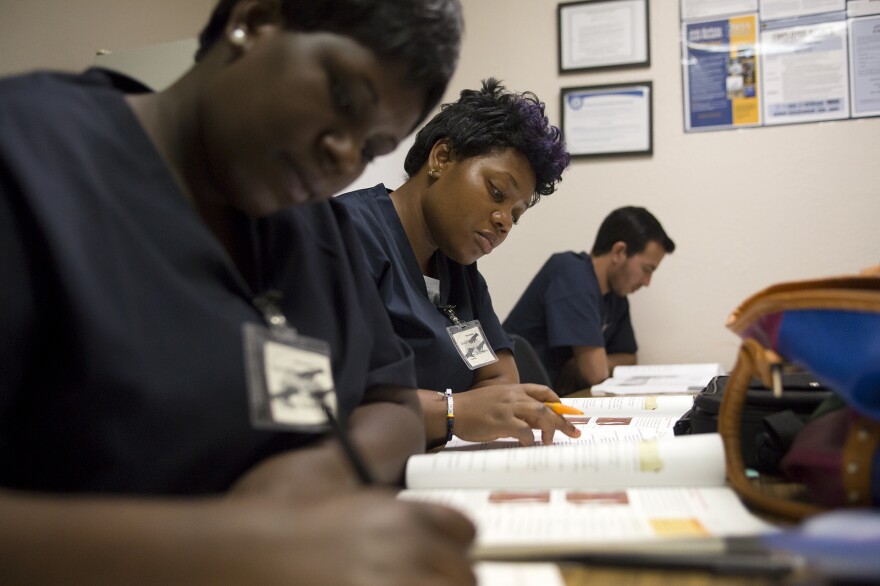Veronique Johnson spends her days at a no-nonsense office on Rundberg Lane, instructing nursing students how to insert catheters, draw blood and bathe life-size mannequins at the Central Texas Nursing Network. She’s been doing this work for 10 years, since she started the business. But, she also has side job – one that doesn’t pay.
Johnson serves as a one-woman information center for a growing number of African immigrants who are trying to find work and adjust to life in Austin.
An increasing number of those African migrants are, like Johnson, from West Africa; she was born in Cameroon and moved to the states 30 years ago.

One of her clients, is 38-year-old Phine Innocent. Like Johnson, he is from French-speaking Cameroon. Before he came to Austin, he lived in Houston. On Wednesday, he visited Johnson to get information for his sister, who initially encouraged him to move to Austin.
“She asked me to come here because it was easier to get a job here in Austin than Houston, and, so, I decided to come here,” Innocent said. “I think it is better.”
And Innocent's not the only one who chose to make the trip to Austin. The most recent figures from the 2015 American Community Survey show there were just over 13,000 African immigrants living in Austin. Their growing presence is evident to people like City of Austin Demographer Ryan Robinson, who notes that Africans – particularly West Africans – are a growing immigrant stream.
“In one year’s time we’ve seen a doubling in the size of the West African population,” Robinson said. “And, then, go back to just 2010, and that number hovered right at about 1,300 and so we’ve almost seen a five-fold increase in the number of West Africans in Central Texas, in metropolitan Austin, in just five years.”

Johnson says she's also seen the increase in African immigrants, not only from West Africa but from throughout the continent. For instance, students in her three-week nurse’s aide class are from Rwanda, Burundi, Cameroon, Jamaica, Cuba and Mexico; only a few are from the U.S.
“Nowadays there is an influx of immigrants coming from Congo. They are refugees, of course – [from] Congo, Sudan, Liberia, Somalia. We didn’t have that before, when I first came over here,” she said. “This is something that is new.”
Like migrants the world over, African immigrants who have found good conditions in Austin encourage others to follow them.

“People that have been here for a long time, you know, they settled down. A lot of the Africans settled, and they have relatives that they brought here. Like me – my brothers and sisters are here. I brought them here," she said. "And those of us that are here, we have friends all over the U.S. We encourage them to come because it’s very easy to make it in Austin. The start of life here is easy for immigrants the start of life is easy for immigrants."
Many of these immigrants, like Johnson, also get jobs in the medical field.
“We average about 500 students a year and about 20 percent are African,” she said.
There aren’t numbers to show where exactly African immigrants live in Austin. But North Austin is home to important African institutions, like two community centers: the Austin Community of Friends Hall and the Jabito Event Center.
“You know when we Africans party, we party until 5 o’clock in the morning. There’s no restriction on time,” she said. “We prefer to go there, to organize whatever is important to us in the community. Rather than renting a hotel where by 2 o'clock, they will tell us to leave.”
There are also two African food markets in North Austin. Johnson visits one or the other at least every week. Earlier this week, she visited the Tropical Market on North Lamar, which is owned by Isioma Osemene, who came from Nigeria 14 years ago. Osemene says, in the past few years, she’s noticed more Africans coming to Austin.
“We have a lot of customers who just moved in [and] they say they just moved from other states,” Osemene said. “They prefer Austin – some because of the weather and the cost of living.”
But, while African immigrants make up a tiny slice of Austin’s 302,000 foreign-born population, demographers say that rapid growth means Austin's immigration is becoming more and more diverse.




